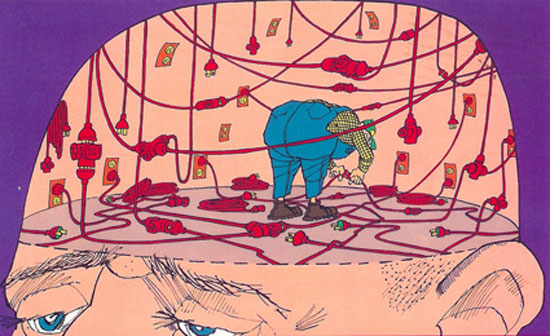In 1994, American scientists published a manifesto based on the ideas of futurologist Alvin Toffler and George Keyworth, former scientific advisor to President Reagan. The manifesto outlines the vision of a global cyberspace and announces a new era as a consequence of knowledge prevailing over matter.
Societies at that time only confirm their existence when they imagine themselves as mythical entities. For within these entities, which are composed of both real elements and desired future extensions, their self-understanding is condensed. If the self-understanding of civil society after the "death of God" referred to mythical entities such as "Nature," "History," or "Humanity," now, after the "death of Man," mass democracy characterizes itself as a "structure" or "functional system" that can be grasped and directed through cybernetics. Under the lens of universal informatics, this system has recently been called "cyberspace" - and the search for an emphatic name corresponded precisely to the need for an impressive substantiation of reality. As an entity with autonomy and its own nomos, cyberspace subordinates human action to its particular logic and simultaneously exhibits characteristics that, as it is said, indicate a shift toward a new historical epoch. The "overturning of matter" is announced - nothing less! - that is, the continually diminishing economic significance of material factors and the dominance of the "forces of the spirit", of knowledge and information.
Above all, this announcement needs commentary. It is a platitude if we consider that the pyramids, for instance, were built not only from material resources like "sandstone" and "forced labor," but also from the dynastic-sovereign "power of the spirit" that directed these resources for its own purposes, as well as the corresponding knowledge. Moreover, the above announcement is misleading because it conceals that the alleged liquefaction of matter has very material preconditions and consequences. Not coincidentally, these new cheerful messages come from the highly industrialized regions of the Earth, where one-sixth of the global population consumes about four-fifths of the world's wealth and energy. As the "American dream," as its authors call it, the cyberspace manifesto originates specifically from a country where four percent of the world's population consumes or wastes a quarter of the world's energy, and every resident, upon reaching the average life expectancy, has consumed, among other things, a thousand trees to satisfy their material needs.
These data do not at all mean that these regions of the Earth owe their high share of global wealth to an equally high (direct) share of the planet's material resources. Their wealth undoubtedly includes significant technological know-how and considerable political-military activity. However, this knowledge and activity have never been decisive in the sense that their bearers could afford to give the rest of the world all the material resources without consequence. On the contrary, knowledge and activity proved decisive precisely because they ensured continuous and privileged access to material resources, regardless of whether they were immediately needed at any given moment. The possibility of a shortage of material resources has always triggered the same reactions as an actual shortage, and this certainly will not change in the future. Only on the basis of secured material reproduction can knowledge become a substantial factor and driving force of that very reproduction; interest in such knowledge inevitably diminishes as soon as the absolutely necessary material basis appears to be at risk. No technology and no cyberspace will be able to safeguard Japan's economic position in the world if its island state is completely and consistently cut off from all raw materials. Conversely, without their enormous potential in material resources and without the political-military coverage of their access to the necessary resources across the entire planet, the United States would never have become the pioneer of cyberspace. Moreover, they vigilantly guard this access day and night, and today Western Europeans and Japanese equally benefit from it. The current situation certainly does not constitute a guarantee for the future.
Nevertheless, within the mass-democratic perception of social matters, the factor of "information" or "communication" overshadows the factor of "material resources" or "production." This seems reasonable when agriculture and industry have achieved such high productivity that the labor of a relatively small minority can ensure the provision of abundant material goods for the social whole, while the large majority works mainly by exchanging signs and symbols. In other words, "communication" ideologically becomes autonomous in relation to "matter" to the extent that fewer and fewer people produce what they themselves consume; to the same extent, the production of material goods is overshadowed or even absorbed by the exchange of symbols (exchange of information and money, but also exchange of services, which, in the language of modern sociology, can be considered symbolic interaction). The impression that matter and concern for its possession are thus disappearing makes the future seem rosy, but it is erroneous. For the surplus of "communication" is due to the specific nature of production ultimately dependent on material resources (mass production); precisely the nature of production allows, and indeed requires, communicative satisfaction. However, the network of exchanges and information would quickly become much sparser if the production of goods were to seriously decline or if a shortage of the necessary material factors for it were to occur. Thus, cyberspace revolves around a hard and by no means small material core, and the process of communication and information in the economic sector is conducted with an eye fixed on this core.
The beati possidentes, the blessed possessors, can afford the luxury of looking down from on high at matter and praising the power of (their own) spirit. But the five (soon to be seven or eight) billion people who want or must emulate them demand, without restraint, the relentless exploitation of material resources for the acquisition of tangible goods. With existing demographic pressure, it is essentially irrelevant whether in their struggle for survival and development they simply destroy or irrationally use material (and ecological) resources. One way or another, the significance of the latter grows, and potential technical progress, which might perhaps reduce energy consumption and environmental burden, would not even offset the side effects of the rapid industrial rise of giants such as China, India, or Brazil; such countries would moreover emerge as strong competitors to today's pioneering nations in all areas, especially in access to global material resources. As cyberspace will aid economic development, it will inadvertently accelerate these processes and contribute to the revaluation of those factors it supposedly marginalizes. Thus, it not only cannot guarantee progress in rationality in the field of social action (see the previous text on the information society), but it will also generate new and unstable data. Those who announce it draw their optimism from the belief that it will abolish borders. However, the borders that the global flood of information will eliminate will be erected again through fierce struggles over distribution, regardless of what the new dividing lines will be and how the new borders will be defined. In the distribution of goods, one is less generous than in the exchange of information. And if the issue of distributing vital material resources - including water and air - arises, then the delights that electronic browsing in cyberspace brings will be abruptly cut short.
Panagiotis Kondylis
Die verflüchtige Materie 4.10.1995
(In the Greek edition: The unstable voids of cyberspace)















